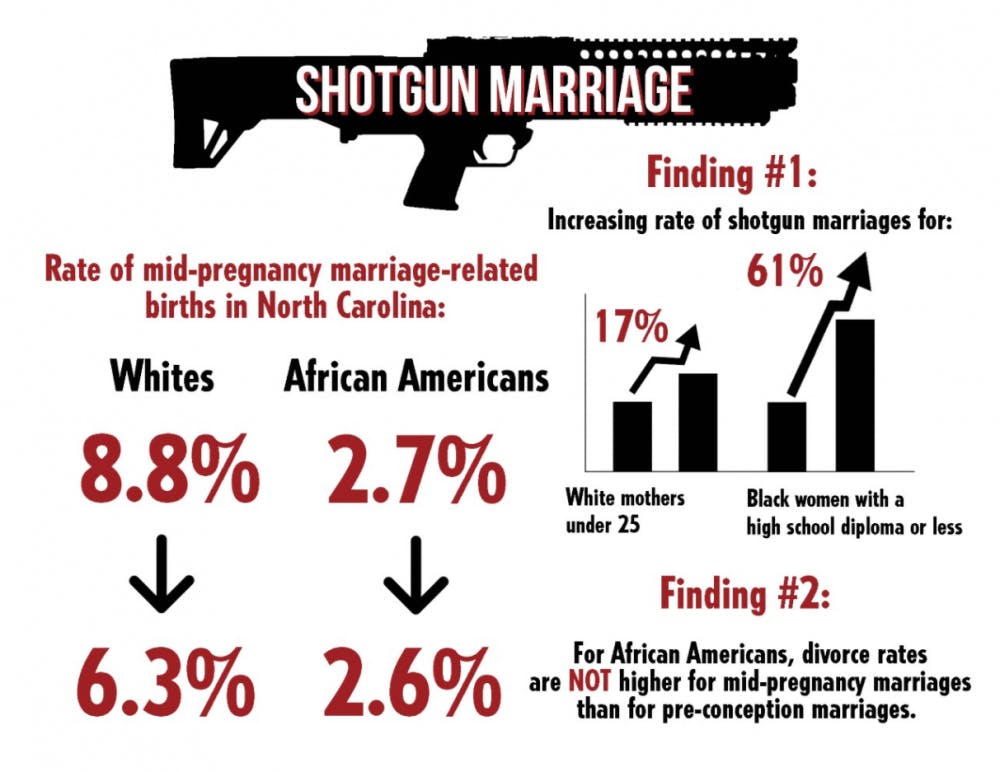Although the notion of a shotgun-wielding father forcing his pregnant daughter to marry her boyfriend is outdated, new research suggests that "shotgun marriages" are still reality.
A study led by Christina Gibson-Davis, an associate professor in the Sanford School of Public Policy, investigated trends in "shotgun marriages" by looking at mid-pregnancy marriage rates in North Carolina. As it turns out, the overall rate of shotgun marriages is declining—but it has increased among certain demographics. And for some, shotgun marriages do not lead to a higher risk of divorce.
“Marriage and fertility seem to have become disconnected,” Gibson-Davis said, referring to the overall trend of declining shotgun marriages. “[We] wanted to know what this disconnect looked like.”
By collecting administrative data on North Carolina births, marriages and divorce rates from 1992 to 2012, the team examined the prevalence of mid-pregnancy marriages and divorces to create a contemporary image of family formation.
North Carolina has high-quality administrative data across various sectors, said Kenneth Dodge, William McDougall professor of public policy studies. This made the study significantly easier for the researchers.
"The willingness of state officials to make this data is unique, splendid and wonderful," he said. "It makes North Carolina a leading laboratory for the nation."
As a share of all births in North Carolina, mid-pregnancy marriage-related births declined from 8.8 percent to 6.3 percent for whites. For African Americans, the rate fell from 2.7 percent to 2.6 percent.
Thus, the overall rate of shotgun marriages in North Carolina as a whole is on the decline.
In certain groups, however, the proportion of mid-pregnancy marriages actually rose as a fraction of all married couples giving birth in North Carolina. This rate increased by 17 percent for white mothers less than 25 years old and by 61 percent for black women whose highest level of eduction is a high school diploma or less.
"Among married parents, a surprisingly high fraction of those marriages will have occurred between the conception and the birth," GIbson-Davis said.
The probability of divorce is also not as straightforward as many think. Among white families, shotgun marriages yielded higher divorce rates, but there was not a significant increase for African American families.
Gibson-Davis noted that shotgun marriages may be occurring for different reasons than in the past, as she said there is less "social pressure to marry" after pregnancy. It is socially acceptable for a woman to raise children without a man being present, she noted.
“It could be that the people who are getting married between the conception and the birth wanted to get married anyway and just happened to get married after the conception," she said. "These might be marriages that are based on the quality of the relationship.”
There is research showing that children are more successful when they come from two-parent households, Gibson-Davis noted. She hopes to continue her study by observing the outcomes of children born to parents who married mid-pregnancy.
"We know that being born out of wedlock, in an unmarried parent family, is associated with harmful outcomes for children," she said. "The question is, would the timing [of marriage] matter?"
Dodge agreed that tracking childhood success could be an important next step and noted that the data is available in state records to conduct such a study. Researchers may be able to match birth circumstances with educational performance to determine how the time of their parents' marriage affected the child, he explained.
Gibson-Davis noted that findings from the study have major implications for formulating family policy strategies.
“There has been a push to encourage parents, particularly low-income parents to marry," she said. "If [policymakers] want to intervene, the question is, when should you be doing that?"
Get The Chronicle straight to your inbox
Signup for our weekly newsletter. Cancel at any time.

